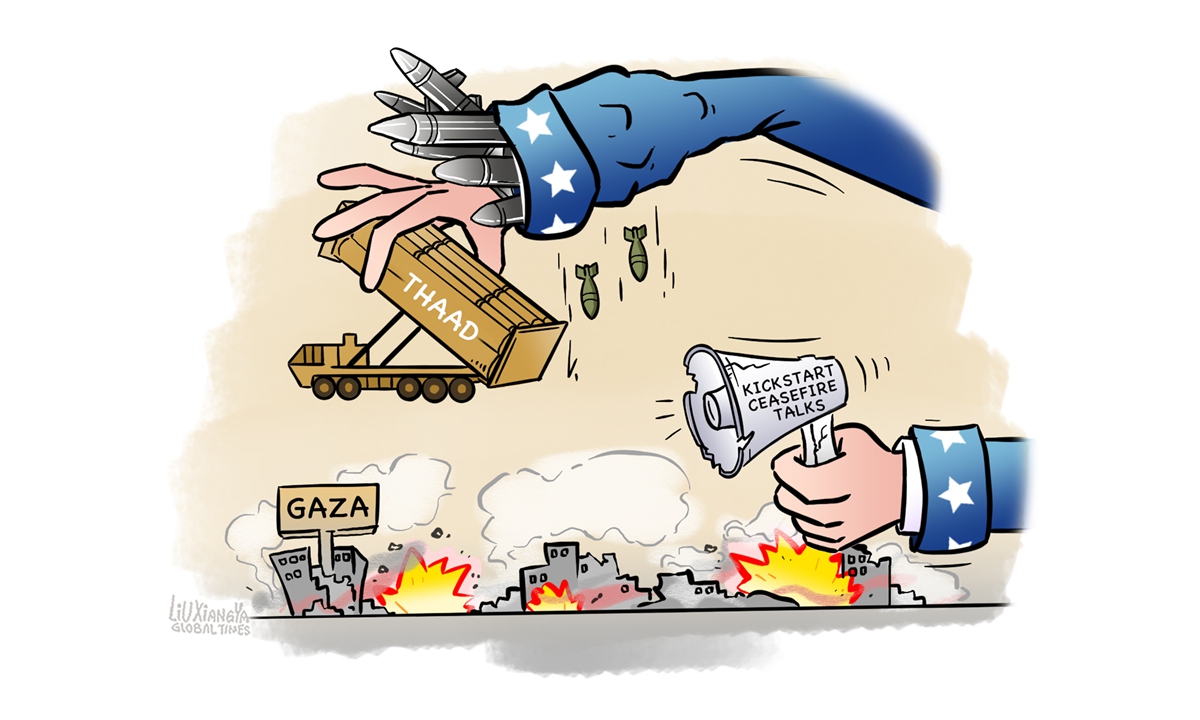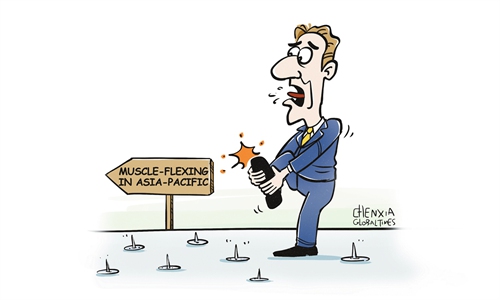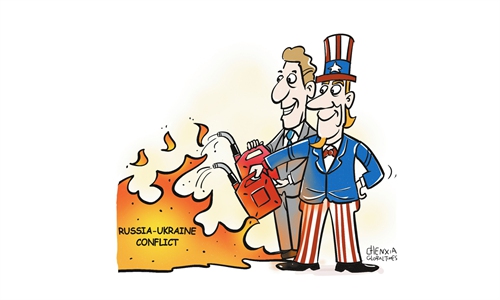US sends officials to Gaza for ceasefire push, after sending bombs, troops, warplanes and THAAD

Illustration: Liu Xiangya/GT
US Secretary of State Antony Blinken landed in Israel on Tuesday with the stated goal of pushing for a ceasefire in the Gaza Strip. Yet, in a glaring contradiction to its self-styled image as a "peacekeeper," the US is simultaneously fanning the flames of conflict by providing advanced military equipment, like the latest deployment of Terminal High Altitude Area Defense (THAAD) systems in Israel.
On Monday, US Defense Secretary Lloyd Austin announced that the US military has rushed its advanced anti-missile system to Israel and it is now "in place." THAAD, one of US military's most prized air defense systems, and one of its most expensive, will be used to "bolster Israel's missile defense capabilities," the Pentagon said last week.
"Defense" is merely an excuse. Everyone knows this is yet another example of how the US fuels escalation. In war-torn regions, a fixed pattern and a vicious cycle often emerge: When tensions flare up, the US steps in to boosts one side's "defense capabilities" - and as a result, the flames of conflict blaze even more fiercely. This is evident when a large number of US bombs and warplanes were sent to Israel before THAAD. And this is also the case after the deployment of the system - strikes are going on, with Lebanese economic centers being targeted.
This time, the US is not only providing more weapons to Israel but also sending troops. Reports indicate roughly 100 troops are being deployed to Israel along with the THAAD system to operate it. These American soldiers are being sent into a conflict like a speeding train, showing no sign of slowing down. Once again, The US is pushing its soldiers into the line of fire on the other side of the world.
However, aside from further entrenching itself in the Middle Eastern conflict, THAAD seems to have a limited deterrent effect. In response to the US' deployment of THAAD and related personnel, some Iranian media outlets pointed out that Iran is capable of overpowering the THAAD system. For instance, Press TV reported that Iran's Kheibar Shekan-2 can "bypass THAAD entirely and effectively and reach its target." Moreover, some military experts analyze that in the event of a saturation missile attack, such as dozens or even hundreds of missiles being launched simultaneously, THAAD could hardly achieve 100 percent interception.
In the face of the turmoil in the Middle East, the current US approach amounts to nothing more than that of a paperhanger. While Washington has advocated for de-escalation in both Gaza and now Lebanon, its efforts have primarily involved cajoling the warring parties and international community rather than taking concrete actions to enforce a ceasefire. The US administration has never sincerely mediated or genuinely aspired to achieve regional peace and stability.
The US has always sought to sustain a continuous yet controllable chaos in the Middle East, Shen Yi, a Fudan University professor, told the Global Times. He added that since the Cold War, US diplomatic efforts in the region have aimed to maintain divisions - divisions between Arab states, divisions between Arabs and Israel. By doing so, Washington could influence the region's dynamics and act as a balance of power, allowing it to exert dominance and advance its strategic goals. After the Cold War, various US actions in the region, including democracy promotion policies, ultimately ended in failure, resulting in a gradual loss of American control over the Middle East.
Now, US expectations of continuous and controllable chaos are fading, as the Gaza war is spiraling out of control and exceeding Washington's grasp. After investing significant amounts of weapons, money and troops, the US has gradually found itself unable to effectively calm the situation or advance its interests in the region. The chaos in Gaza has even forced US officials to repeatedly visit the region, hoping to steer events in line with American priorities. This might be the ultimate irony of Washington's so-called Middle East policy: Instead of making the region a pawn in its global strategy, the US itself risks becoming a pawn in the Middle East's game.
History has shown that half-hearted policies often lead to poor outcomes. If the US truly wants to be a "messenger of peace" calling for a ceasefire, difficult decisions are needed to put real pressure on all parties involved in the conflict, rather than simply supplying one side with a large quantity of weapons.



